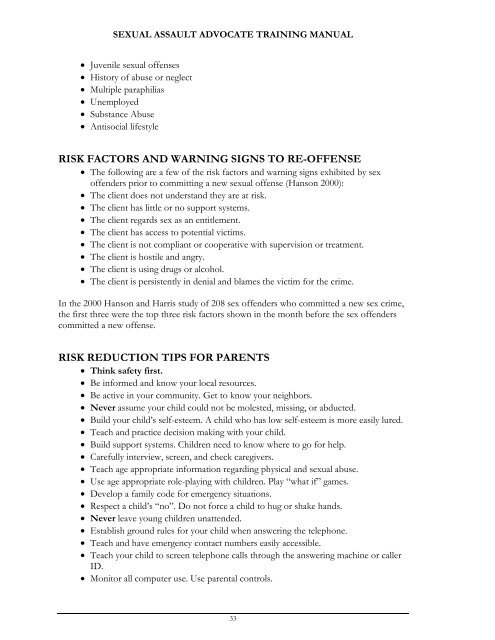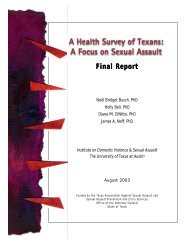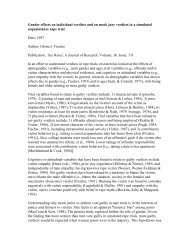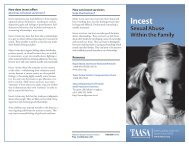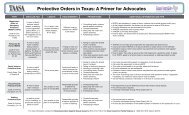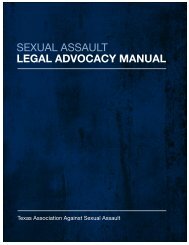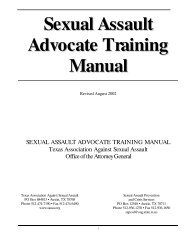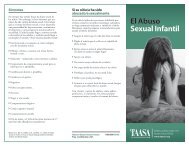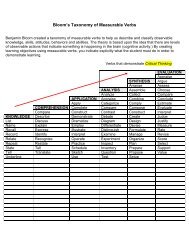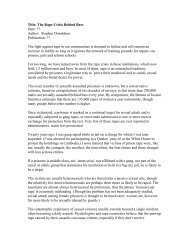- Page 1: Sexual Assault Advocate Training Ma
- Page 5: Contributors The developers of this
- Page 8 and 9: SEXUAL ASSAULT ADVOCATE TRAINING MA
- Page 10 and 11: SEXUAL ASSAULT ADVOCATE TRAINING MA
- Page 12 and 13: SEXUAL ASSAULT ADVOCATE TRAINING MA
- Page 14 and 15: SEXUAL ASSAULT ADVOCATE TRAINING MA
- Page 16 and 17: SEXUAL ASSAULT ADVOCATE TRAINING MA
- Page 18 and 19: SEXUAL ASSAULT ADVOCATE TRAINING MA
- Page 20 and 21: SEXUAL ASSAULT ADVOCATE TRAINING MA
- Page 22 and 23: SEXUAL ASSAULT ADVOCATE TRAINING MA
- Page 24 and 25: SEXUAL ASSAULT ADVOCATE TRAINING MA
- Page 26 and 27: SEXUAL ASSAULT ADVOCATE TRAINING MA
- Page 28 and 29: SEXUAL ASSAULT ADVOCATE TRAINING MA
- Page 30 and 31: SEXUAL ASSAULT ADVOCATE TRAINING MA
- Page 32 and 33: SEXUAL ASSAULT ADVOCATE TRAINING MA
- Page 34 and 35: SEXUAL ASSAULT ADVOCATE TRAINING MA
- Page 36 and 37: SEXUAL ASSAULT ADVOCATE TRAINING MA
- Page 40 and 41: SEXUAL ASSAULT ADVOCATE TRAINING MA
- Page 42 and 43: SEXUAL ASSAULT ADVOCATE TRAINING MA
- Page 44 and 45: SEXUAL ASSAULT ADVOCATE TRAINING MA
- Page 46 and 47: SEXUAL ASSAULT ADVOCATE TRAINING MA
- Page 48 and 49: SEXUAL ASSAULT ADVOCATE TRAINING MA
- Page 50 and 51: SEXUAL ASSAULT ADVOCATE TRAINING MA
- Page 52 and 53: SEXUAL ASSAULT ADVOCATE TRAINING MA
- Page 54 and 55: SEXUAL ASSAULT ADVOCATE TRAINING MA
- Page 56 and 57: SEXUAL ASSAULT ADVOCATE TRAINING MA
- Page 58 and 59: SEXUAL ASSAULT ADVOCATE TRAINING MA
- Page 60 and 61: SEXUAL ASSAULT ADVOCATE TRAINING MA
- Page 62 and 63: SEXUAL ASSAULT ADVOCATE TRAINING MA
- Page 64 and 65: SEXUAL ASSAULT ADVOCATE TRAINING MA
- Page 66 and 67: SEXUAL ASSAULT ADVOCATE TRAINING MA
- Page 68 and 69: SEXUAL ASSAULT ADVOCATE TRAINING MA
- Page 70 and 71: SEXUAL ASSAULT ADVOCATE TRAINING MA
- Page 72 and 73: SEXUAL ASSAULT ADVOCATE TRAINING MA
- Page 74 and 75: SEXUAL ASSAULT ADVOCATE TRAINING MA
- Page 76 and 77: SEXUAL ASSAULT ADVOCATE TRAINING MA
- Page 78 and 79: SEXUAL ASSAULT ADVOCATE TRAINING MA
- Page 80 and 81: SEXUAL ASSAULT ADVOCATE TRAINING MA
- Page 82 and 83: SEXUAL ASSAULT ADVOCATE TRAINING MA
- Page 84 and 85: SEXUAL ASSAULT ADVOCATE TRAINING MA
- Page 86 and 87: SEXUAL ASSAULT ADVOCATE TRAINING MA
- Page 88 and 89:
SEXUAL ASSAULT ADVOCATE TRAINING MA
- Page 90 and 91:
SEXUAL ASSAULT ADVOCATE TRAINING MA
- Page 92 and 93:
SEXUAL ASSAULT ADVOCATE TRAINING MA
- Page 94 and 95:
SEXUAL ASSAULT ADVOCATE TRAINING MA
- Page 96 and 97:
SEXUAL ASSAULT ADVOCATE TRAINING MA
- Page 98 and 99:
SEXUAL ASSAULT ADVOCATE TRAINING MA
- Page 100 and 101:
SEXUAL ASSAULT ADVOCATE TRAINING MA
- Page 102 and 103:
SEXUAL ASSAULT ADVOCATE TRAINING MA
- Page 104 and 105:
SEXUAL ASSAULT ADVOCATE TRAINING MA
- Page 106 and 107:
SEXUAL ASSAULT ADVOCATE TRAINING MA
- Page 108 and 109:
SEXUAL ASSAULT ADVOCATE TRAINING MA
- Page 110 and 111:
SEXUAL ASSAULT ADVOCATE TRAINING MA
- Page 112 and 113:
SEXUAL ASSAULT ADVOCATE TRAINING MA
- Page 114 and 115:
SEXUAL ASSAULT ADVOCATE TRAINING MA
- Page 116 and 117:
SEXUAL ASSAULT ADVOCATE TRAINING MA
- Page 118 and 119:
SEXUAL ASSAULT ADVOCATE TRAINING MA
- Page 120 and 121:
SEXUAL ASSAULT ADVOCATE TRAINING MA
- Page 122 and 123:
SEXUAL ASSAULT ADVOCATE TRAINING MA
- Page 124 and 125:
SEXUAL ASSAULT ADVOCATE TRAINING MA
- Page 126 and 127:
SEXUAL ASSAULT ADVOCATE TRAINING MA
- Page 128 and 129:
SEXUAL ASSAULT ADVOCATE TRAINING MA
- Page 130 and 131:
SEXUAL ASSAULT ADVOCATE TRAINING MA
- Page 132 and 133:
SEXUAL ASSAULT ADVOCATE TRAINING MA
- Page 134 and 135:
SEXUAL ASSAULT ADVOCATE TRAINING MA
- Page 136 and 137:
SEXUAL ASSAULT ADVOCATE TRAINING MA
- Page 138 and 139:
SEXUAL ASSAULT ADVOCATE TRAINING MA
- Page 140 and 141:
SEXUAL ASSAULT ADVOCATE TRAINING MA
- Page 142 and 143:
SEXUAL ASSAULT ADVOCATE TRAINING MA
- Page 144 and 145:
SEXUAL ASSAULT ADVOCATE TRAINING MA
- Page 146 and 147:
SEXUAL ASSAULT ADVOCATE TRAINING MA
- Page 148 and 149:
SEXUAL ASSAULT ADVOCATE TRAINING MA
- Page 150 and 151:
SEXUAL ASSAULT ADVOCATE TRAINING MA
- Page 152 and 153:
SEXUAL ASSAULT ADVOCATE TRAINING MA
- Page 154 and 155:
SEXUAL ASSAULT ADVOCATE TRAINING MA
- Page 156 and 157:
SEXUAL ASSAULT ADVOCATE TRAINING MA
- Page 158 and 159:
SEXUAL ASSAULT ADVOCATE TRAINING MA
- Page 160 and 161:
SEXUAL ASSAULT ADVOCATE TRAINING MA
- Page 162 and 163:
SEXUAL ASSAULT ADVOCATE TRAINING MA
- Page 164 and 165:
SEXUAL ASSAULT ADVOCATE TRAINING MA
- Page 166 and 167:
SEXUAL ASSAULT ADVOCATE TRAINING MA
- Page 168 and 169:
SEXUAL ASSAULT ADVOCATE TRAINING MA
- Page 170 and 171:
SEXUAL ASSAULT ADVOCATE TRAINING MA
- Page 172 and 173:
SEXUAL ASSAULT ADVOCATE TRAINING MA
- Page 174 and 175:
SEXUAL ASSAULT ADVOCATE TRAINING MA
- Page 176 and 177:
SEXUAL ASSAULT ADVOCATE TRAINING MA
- Page 178 and 179:
SEXUAL ASSAULT ADVOCATE TRAINING MA
- Page 180 and 181:
SEXUAL ASSAULT ADVOCATE TRAINING MA
- Page 182 and 183:
SEXUAL ASSAULT ADVOCATE TRAINING MA
- Page 184 and 185:
SEXUAL ASSAULT ADVOCATE TRAINING MA
- Page 186 and 187:
SEXUAL ASSAULT ADVOCATE TRAINING MA
- Page 188 and 189:
SEXUAL ASSAULT ADVOCATE TRAINING MA
- Page 190 and 191:
SEXUAL ASSAULT ADVOCATE TRAINING MA
- Page 192 and 193:
SEXUAL ASSAULT ADVOCATE TRAINING MA
- Page 194 and 195:
SEXUAL ASSAULT ADVOCATE TRAINING MA
- Page 196 and 197:
SEXUAL ASSAULT ADVOCATE TRAINING MA
- Page 198 and 199:
SEXUAL ASSAULT ADVOCATE TRAINING MA
- Page 200 and 201:
SEXUAL ASSAULT ADVOCATE TRAINING MA
- Page 202 and 203:
SEXUAL ASSAULT ADVOCATE TRAINING MA
- Page 204 and 205:
SEXUAL ASSAULT ADVOCATE TRAINING MA
- Page 206 and 207:
SEXUAL ASSAULT ADVOCATE TRAINING MA
- Page 208 and 209:
SEXUAL ASSAULT ADVOCATE TRAINING MA
- Page 210 and 211:
SEXUAL ASSAULT ADVOCATE TRAINING MA
- Page 212 and 213:
SEXUAL ASSAULT ADVOCATE TRAINING MA
- Page 214 and 215:
SEXUAL ASSAULT ADVOCATE TRAINING MA
- Page 216 and 217:
SEXUAL ASSAULT ADVOCATE TRAINING MA
- Page 218 and 219:
SEXUAL ASSAULT ADVOCATE TRAINING MA
- Page 220 and 221:
SEXUAL ASSAULT ADVOCATE TRAINING MA
- Page 222 and 223:
SEXUAL ASSAULT ADVOCATE TRAINING MA
- Page 224 and 225:
SEXUAL ASSAULT ADVOCATE TRAINING MA
- Page 226 and 227:
SEXUAL ASSAULT ADVOCATE TRAINING MA
- Page 228 and 229:
SEXUAL ASSAULT ADVOCATE TRAINING MA
- Page 230 and 231:
SEXUAL ASSAULT ADVOCATE TRAINING MA
- Page 232 and 233:
SEXUAL ASSAULT ADVOCATE TRAINING MA
- Page 234 and 235:
SEXUAL ASSAULT ADVOCATE TRAINING MA
- Page 236 and 237:
SEXUAL ASSAULT ADVOCATE TRAINING MA
- Page 238 and 239:
SEXUAL ASSAULT ADVOCATE TRAINING MA
- Page 240 and 241:
SEXUAL ASSAULT ADVOCATE TRAINING MA
- Page 242 and 243:
SEXUAL ASSAULT ADVOCATE TRAINING MA
- Page 244 and 245:
SEXUAL ASSAULT ADVOCATE TRAINING MA
- Page 246 and 247:
SEXUAL ASSAULT ADVOCATE TRAINING MA
- Page 248 and 249:
SEXUAL ASSAULT ADVOCATE TRAINING MA
- Page 250 and 251:
SEXUAL ASSAULT ADVOCATE TRAINING MA
- Page 252 and 253:
SEXUAL ASSAULT ADVOCATE TRAINING MA
- Page 254 and 255:
SEXUAL ASSAULT ADVOCATE TRAINING MA
- Page 256 and 257:
SEXUAL ASSAULT ADVOCATE TRAINING MA
- Page 258 and 259:
SEXUAL ASSAULT ADVOCATE TRAINING MA
- Page 260 and 261:
SEXUAL ASSAULT ADVOCATE TRAINING MA
- Page 262 and 263:
SEXUAL ASSAULT ADVOCATE TRAINING MA
- Page 264 and 265:
SEXUAL ASSAULT ADVOCATE TRAINING MA
- Page 266 and 267:
SEXUAL ASSAULT ADVOCATE TRAINING MA
- Page 268 and 269:
SEXUAL ASSAULT ADVOCATE TRAINING MA
- Page 270 and 271:
SEXUAL ASSAULT ADVOCATE TRAINING MA
- Page 272 and 273:
SEXUAL ASSAULT ADVOCATE TRAINING MA
- Page 274 and 275:
SEXUAL ASSAULT ADVOCATE TRAINING MA
- Page 276 and 277:
SEXUAL ASSAULT ADVOCATE TRAINING MA
- Page 278 and 279:
SEXUAL ASSAULT ADVOCATE TRAINING MA
- Page 280 and 281:
SEXUAL ASSAULT ADVOCATE TRAINING MA
- Page 282 and 283:
SEXUAL ASSAULT ADVOCATE TRAINING MA
- Page 284 and 285:
SEXUAL ASSAULT ADVOCATE TRAINING MA
- Page 286 and 287:
SEXUAL ASSAULT ADVOCATE TRAINING MA
- Page 288 and 289:
SEXUAL ASSAULT ADVOCATE TRAINING MA
- Page 290 and 291:
SEXUAL ASSAULT ADVOCATE TRAINING MA
- Page 292 and 293:
SEXUAL ASSAULT ADVOCATE TRAINING MA
- Page 294 and 295:
SEXUAL ASSAULT ADVOCATE TRAINING MA
- Page 296 and 297:
SEXUAL ASSAULT ADVOCATE TRAINING MA
- Page 298 and 299:
SEXUAL ASSAULT ADVOCATE TRAINING MA
- Page 300 and 301:
SEXUAL ASSAULT ADVOCATE TRAINING MA
- Page 302 and 303:
SEXUAL ASSAULT ADVOCATE TRAINING MA


